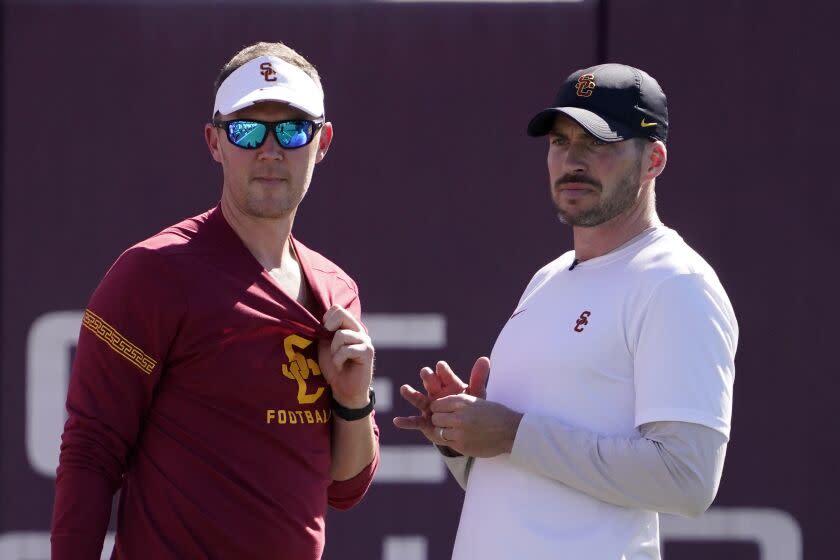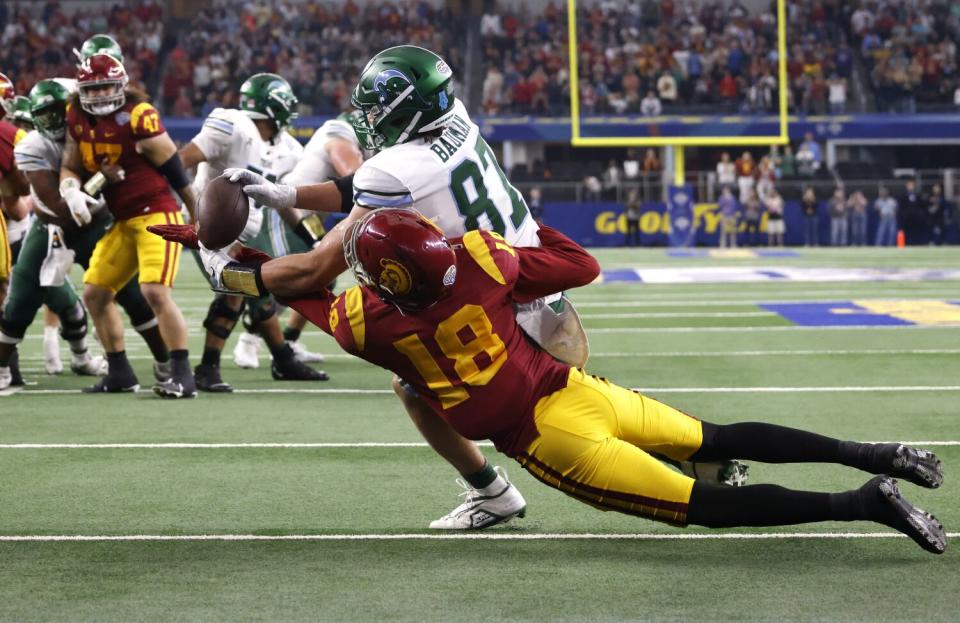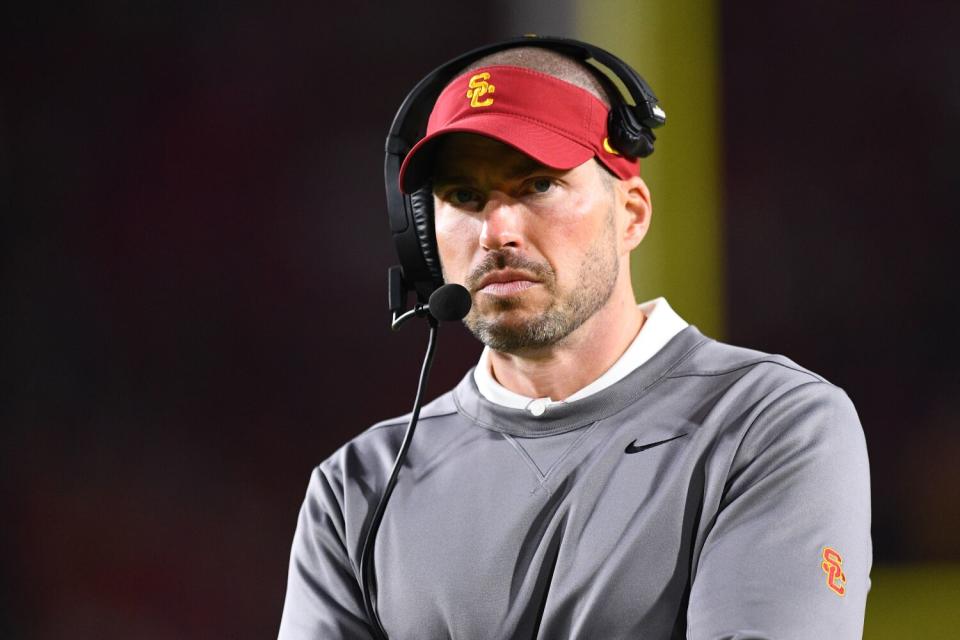USC coach Lincoln Riley defends keeping Alex Grinch and outlines plans for Year 2

When Lincoln Riley first hired Alex Grinch to direct his defense at Oklahoma, the coach expected it would take time before expectations matched reality. His new coordinator stepped into a difficult spot rebuilding a broken defense, one he knew probably required patience.
But Grinch, who previously engineered a quick turnaround at Washington State, exceeded Riley's expectations during his first season at Oklahoma. The next year, the Sooners' defense took an even bigger leap forward.
To Riley, the two-year turnaround at Oklahoma was proof of concept for Grinch’s process. Compelling enough to keep Riley's confidence at USC, where Grinch’s debut as his defensive coordinator went nowhere near as well, concluding with a Cotton Bowl collapse and subsequent calls for Grinch’s ouster.
Questions about the direction of USC’s defense — and the staff tasked with turning it around — have raged on since. But any doubts about Grinch’s future at USC were put to rest Tuesday by Riley, who reaffirmed his belief the coordinator could still turn around the Trojans defense.
“I've been through it enough with that guy to know, don't bet against him,” Riley said of Grinch. “I know what he's made of. I just do, and I know it's getting ready to happen defensively, and so I just have a confidence and a belief there in not just Alex, but the other guys in the room.”
Little about the way USC’s defense finished the season suggests the unit was on the verge of any sort of breakthrough. USC allowed nearly 2,000 yards during its final four games, before bottoming out against Tulane in the bowl game. After weeks of trumpeting its progress during bowl prep, the Trojans' defense was trounced for more than 10 yards per play in an embarrassing, last-second loss.
In the lead-up to that bowl defeat, Grinch offered his own assessment when asked what USC’s defense accomplished in his first season.
“The answer is, ‘Not enough,’ ” he said. “You’re charged with having a championship-level defense at USC. You signed up for that. We played good enough defense 11 times. We didn’t play good enough defense two times, but I don’t take a lot of solace in that. We were expected to have a championship-level defense, and we weren’t able to do that in the ’22 season.”
The reality, Riley explained, was USC didn’t have the necessary depth and talent on defense to meet those expectations — even if Grinch was reluctant to admit as much. As the season went on, Riley said, the defense wore down, leaving that depth in more dire straits.
USC allowed 37 points per game during the final eight games of the season after holding its first six opponents to an average just below 19. During a full season, that was the difference between a top-10 defense in college football and one in the bottom 10.
“Typically great groups, they get off to a good start,” Riley said. “They get some momentum, and then, as guys go out or as guys get worn down, you have kind of this underbelly of talent that starts to show up, and they're developing through the year, and this guy's out, this guy makes an impact, or this guy jumps in kind of unexpectedly and adds that, that kind of added boost at the end of the year. And that didn't necessarily happen defensively.”

Still, those results didn't change how Riley felt about the future of his defense under Grinch. Nor did it change the scale of USC’s stellar turnaround, from a 4-8 disaster to an 11-3 contender that came up a game short of the College Football Playoff semifinals during the first season of a new regime.
While coming to terms with his defense’s shortcomings, Riley was sure to reiterate that fact.
“It can’t get lost, the historic turnaround that happened this season,” Riley said. “It can’t get lost. And not just the 11 wins and team success and individual success, but just across the entire program. We could have won seven or eight games and then if all the things internally still had happened, you could recognize the progress internally by other measuring sticks.”
Ending an otherwise bright season on a bitter note in the Cotton Bowl didn’t help that perception. But Riley said he never wavered in his backing of Grinch. The staff was already working on how to iron out its defensive issues on the plane ride home from Dallas.
The week that followed included “a deep dive” into all that ailed the unit this season. All the while, frustrated fans speculated whether Riley would fire Grinch for his failings down the stretch of his first season.
That week, Riley said, gave him “clarity of exactly where we were and where we’re at in all parts of the program.”
“It’s a world for us, you can very easily get tempted into making emotional quick decisions because the rest of the world wants you to, and everybody lives and dies with every game and every play,” Riley said.

But Riley said he refused to judge Grinch over a single season, having seen him turn around other defenses in the past.
He pointed instead to Texas, his former rival, where coach Steve Sarkisian opted this season to stick with his defensive coordinator, Pete Kwiatkowski, after a down debut campaign. The Longhorn defense, in turn, experienced a renaissance in Year 2, jumping from 99th to 28th in scoring defense this season.
“[Sarkisian] could’ve left Year 1, freaked out, and that’s a place that, as we all know, will make some rash decisions,” Riley said. “But he held form … and [Kwiatkowski] did what a proven, really good coach at a high level does.”
Riley is betting on the same leap out of Grinch. Though it’s not all on him alone. USC’s coach said he plans to take a more active role on defense now that he’s no longer focused on revamping other parts of the program.
The coming months, he said, will be critical in determining the direction that unit takes from here. USC must find a way to replace the production of its top pass rusher, Tuli Tuipulotu, as well as its top cover corner, Mekhi Blackmon. It’s already raided the transfer portal and added nine defensive recruits, more than USC had in its entire freshman class last season.
But when it comes to the coach leading the way, Riley has no question about where USC’s defense is headed. Whether that confidence will be rewarded remains to be seen.
“Not one second have I ever doubted that we have the right people in the room,” Riley said. “That doesn’t mean you don’t take a look back at it and make sure and confirm those beliefs.”
“But I know we have the right person there.”
This story originally appeared in Los Angeles Times.

